
It seems that every day in the world of business, a new conundrum arises requiring sharp and flexible thought on the part of MBAs to enable us to examine and make sense of it. (We can teach you how at A Lunchtime MBA)
Such is the case of a recent dispute between an Uber Eats driver here in Adelaide, or, should I say, a driver who decided to accept a series of jobs from Uber Eats, and the monolithic, octopus-like entity that is Uber, with its growing number of long tentacles reaching into nooks and crannies of the gig economy all over the world.
The surprising insight I’d like us to consider today is a statement made to a Federal Court by counsel representing Uber that there exists no “relationship of employment” between Uber and any of the riders or drivers delivering orders placed with the Uber Eats app.
You can read a summary of the unfair dismissal claim and its subsequent court action in this fine bit of journalism undertaken by ABC News’ Candice Prosser: Uber settles out of court with driver who alleged unfair dismissal for late delivery.
In fact, counsel representing Uber said the way to understand the dynamics of the situation with Uber Eats is that there is a “quadrilateral” relationship at play with every delivery between Uber Eats, the restaurant, the delivery driver, and the customer. And furthermore, a driver or “delivery partner” was under no obligation to accept any delivery or even complete it once started.
How astonishing. A driver could happily abandon delivery if they desired without any consequences according to Uber’s counsel who said the giant was “agnostic” about delivery cancellations.
I can assure you that on the odd occasion when we’ve used Uber Eats to deliver victuals for an impromptu late one on campus, we would not have felt so “agnostic” about a driver deciding to abscond with our meal, nor would the restaurant.
Perhaps the company’s advertising slogan should change from “Tonight I’ll be eating …” to “Tonight I’ll be ordering ambiguity”.
Get out your Gerbil, we have a mystery to solve
When trying to understand business systems, I always reach for my Gerbil (a fond name I’ve given to Michael Gerber who wrote E-Myth Revisited, a business text that has burrowed its way deeply into my psyche). It is a seminal work that breaks down the process of enterprises into clear lines of accountability, repeatable processes, and a game mindset for reviewing and implementing how jobs are done.
And to avoid getting embroiled in the specific case, let’s imagine Uber decided to enter the education realm and created Uber Teach. This might help us understand the dynamics at play.
Let’s start by identifying the four parties having a quadrilateral relationship in this mythical entity known as Uber Teach.
- Firstly, there’s Uber, creating an app to connect people’s appetites for learning with a “teaching partner”.
- Secondly, there’s the school, this is a local entity that serves education on premise but which has started exploring home delivery in the wake of Covid-19.
- Thirdly, you have the consumer, the one with an appetite for learning, who might well have been thinking, Today I’ll be learning Greek.
- And finally, we have the teaching partner, who’ll be delivering the “learning”.
How would this work? Well, we always start with what we know.
As Gerber says, demographics and psychographics rule the day because they tell us who our customer is and what prompts them to buy.
Let’s assume our target market is school age children and what is prompting them to “buy” is a compulsion by the authorities that they must undertake education until age 15. This is what fuels their hunger.
So, they download the hypothetical Uber Teach app and search for something to learn, like Physics.
The app would show them a list of Schools in the area who service where they live and who’ve agreed to put the delivery of their teaching into the hands of a Teaching Partner who might or might not feel compelled to complete the job.
If the School accepts the order, the app would then alert Teaching Partners to see who wants it. Hopefully, one wouldn’t get my old physics teacher from year 12 because he never washed, smoked like a chimney, and rarely seemed awake. Thankfully, he would be unlikely to answer the app!
So, we have a Teaching Partner collecting Learning from a School and then starting to head to the Student.
But, alas, on their way, they decide they need a sabbatical and so decide to park and take a stroll along the beach. What happens now?
And now four becomes five
One would imagine the Student being relieved and pretty chill and giving the Teaching Partner a good rating.
So, I would imagine we’d need a fifth player in what is now a Pentilateral relationship, a Parent.
The Parent would be very unhappy that they’d paid for Learning that has not been delivered, so they’d contact the School and demand a refund.
The School would possibly invoke the need to talk to a sixth player, the Education Department, because they register Teaching Partners in the first place, making this a Hexilateral relationship.
Eventually, unregistered Teaching Partners would enter the fray, as might unregistered Schools, thus serving up a fast food equivalent of solid education.
This would make life easier and sweeter for Students, at least in the short term, create the perception among Parents that Learning is happening, but lead to some turmoil among registered Schools that are now facing lower demand.
With a flood of unregistered Learning Partners now eager to deliver Learning (there would now be little point in them getting registered) the influence of the Education Department would soon be undermined.
It is a masterful system, with a gaming mindset involved via a clever app that pings and whistles, but how does this thought experiment help us understand the alleged unfair dismissal case?
It would seem that the buck rests with nobody. If a Student complains about a Teaching Partner being late or not turning up, they risk their Parents getting involved and overseeing what they’re ordering. If a Parent does complain to a School, they’ll pass the buck to the Education Department but they’ll wipe their hands saying the Teaching Partner was not registered. And if a Teaching Partner complains, it’s quite possible they’ll lose access to the Uber Teach app, thus cutting off access to Jobs, which prompts me to ask, what would Steve Jobs do?
The late, great Apple leader had a very famous mantra, just ship it.
But, alas, it seems that “shipping it” is the very core, the apple core if you like, of this conundrum.
So, the key question is, when is your boss not your boss? The answer must be when your boss takes the form of a mythical app.
Perhaps it is time for E-Myth Revisited to be rewritten and updated as The Uber Myth Un-Delivered? In fact, I might write it myself but I think I’ll make it an ebook to cut out all the middle people and go back to basics like a small business person, and have it delivered to you via that trustworthy, humble app, Amazon.
You can expand your business thinking by doing A Lunchtime MBA during the Adelaide Fringe semester.


Leave a Reply